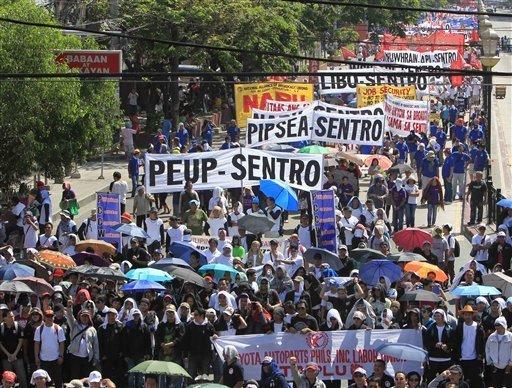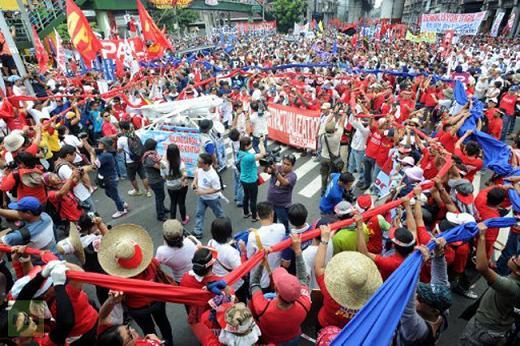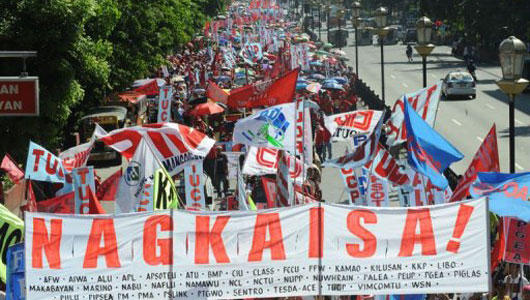

PHILIPPINES: Sentro, Nagkaisa herald new era of labor unity
Wanneer: 03/05/2012 - 08:07
THOUSANDS of trade unionists and activists poured into the streets of Manila and other key cities to celebrate May Day amid renewed hopes that the two latest efforts at labor unity will provide strong impetus to their uphill battle for labor and trade union rights.



At least 5,000 affiliates of the Sentro ng mga Progresibong Manggagawa (Sentro), a newly organized labor center, joined a more massive march and rally in Manila of the recently launched Nagkaisa! labor coalition.
From five converging places along España Blvd., about 20,000 Nagkaisa! members linked up and marched towards Mendiola, near the Malacañang Palace, for an unprecedented unity calling for an end to rampant contractualization, enactment of the Security of Tenure bill in the Congress, across-the-board wage hike, among others.
Similar Sentro and Nagkaisa! mobilizations were simultaneously held in main cities or provinces nationwide, including Lipa, Pampanga, Baguio, Legaspi, Cebu, Iloilo, Davao, Cagayan de Oro, General Santos, and Cotobato.
“Labor unity, however elusive is not totally impossible; but it must be actively pursued and nurtured because a fragmented and weak labor movement can never effectively defend and advance the interests of the workers and the masses, especially at this time of relentless global attacks from the neoliberal clique,” Frank Mero, SENTRO spokesperson said.
“The ‘Labor Unity March’ is a signal that the majority of the mainstream trade unions and other workers’ organizations are ready to take on the policies issues that have been ignored by governments for a long time,” Mero said.
Both SENTRO and NAGKAISA are calling on the Aquino government to: address the worsening precarious work in the country and certify as urgent the passage of security of tenure bill for the private sector (HB 4853) and for the public sector (SB 2875) that is now pending in Congress; support the workers’ demand for across the board wage increases for both the public and private sectors; address the failures of market-oriented policies in public utilities by scraping the EPIRA law and the Oil Deregulation law; prevent the violent demolitions of informal settlers by issuing an Executive Order that would stop the demolition of informal settlers and fast track the development of decent and adequate housing for the poor; provide solid guarantees for workers’ right to self-organization; and, protect and generate secure and decent jobs for all.
Launched only on April 12, Sentro is a national labor center composed of unions and federations in different industries and their subsectors – metal, including automotive, hotel and hospitality, postal, banking, broadcast media, food and beverages, seafaring – as well as the public sector and sectoral groupings of informal sector and urban poor, women, and youth.
Sentro is a member of the broad labor coalition aptly named Nagkaisa! (or united) that was also established last month and comprised by about 40 major trade unions and federations in the country.
Described as an issue-based, multiform and multi-ideological labor alliance, Nagkaisa! is nonetheless a breakthrough in the Philippine labor front as the last time a comparable coalition existed was in 1989 – the Labor Alliance for Wage Increase of P35 (Lawin 35).
The Sentro affiliates are the Alliance of Progressive Labor (APL), APL-Youth, Federation of Coca-Cola Unions (FCCU), Kapisanan ng Maralitang Obrero (KAMAO), League of Independent Bank Organizations (LIBO), MARINO seafarers’ group, National Alliance of Broadcast Unions (NABU), National Confederation of Transportworkers’ Unions (NCTU), National Union of Workers in Hotel, Restaurant and Allied Industries (NUWHRAIN), Philippine Independent Public Sector Employees Association (PIPSEA), Philippine Metalworkers’ Alliance (PMA), Pinag-isang Tinig at Lakas ng Anakpawis (PIGLAS), Postal Employees Union of the Philippines (PEUP), and Workers’ Solidarity Network (WSN).
On the other hand, the roster of the Nagkaisa! include the Alliance of Filipino Workers (AFW), affiliates of the Associated Labor Unions-Trade Union Congress of the Philippines (ALU-TUCP), members of SENTRO, Bukluran ng Manggagawang Pilipino (BMP), Confederation of Independent Unions in the Public Sector (CIU), Federation of Free Workers (FFW), Manggagawa para sa Kalayaan ng Bayan (MAKABAYAN), National Federation of Labor Unions (NAFLU), National Mines and Allied Workers’ Union (NAMAWU), National Confederation of Labor (NCL), Philippine Airlines Employees Association (PALEA), Philippine Government Employees Association (PGEA), Partido ng Manggagawa (PM), Public Services Labor Independent Confederation (PSLINK), Philippine Transport and General Workers Organization (PTGWO), Technical Education and Skills Development Authority-Association of Concerned Employees (TESDA-ACE).
http://www.apl.org.ph/
__________________________________________________________________________
Akbayan calls for end to contractualization on eve of Labor Day
By Akbayan (Citizens Action Party)
Akbayan Party today welcomed the eve of Labor Day by unfurling a banner in Welcome Rotunda calling for an end to contractualization. Joined by members of the newly formed labor center, SENTRO, the political party said that the continued erosion of labor rights coupled with the increase in prices of basic goods should be a cause of concern to the government and that it should immediately push for the passage of the Security of Tenure Bill.
According to Akbayan Representative Kaka Bag-ao, one of the authors of the Security of Tenure Bill, contractualization together with the increase of electricity and oil prices was pushing many working Filipinos deeper into poverty.
“Contractualization of labor has only pushed more and more Filipinos into poverty. Because these contractual employees do not enjoy the same rights as those of regular employees, such as the right to form union and therefore join in collective bargaining agreements, they are often subjected to abuses from their employers and are left with the losing end of the deal”
“Also, the steady increase in the prices of basic commodities and the price of oil and electricity is driving more Filipinos into poverty or ensures that they remain in that position,” according to Bag-ao.
Bag-ao also urged the government to consider certain measures to ease the burden on many working Filipinos such as suspending or fully eliminating the VAT on oil products, ending the demolition of informal settler communities and enforcement of a holistic plan on housing such as the Balanced Housing Bill, and preventing the privatization of power plants in Mindanao.
“Much of the labor force in the country also belongs to the poorer and more disadvantaged sectors of our society. What is needed is really a broad approach to ease the burden on the Filipino workers and their families. Measures such as eliminating the VAT on oil and preventing the privatization of power plants could go a long way as to prevent the erosion of their income.”
“Also, many of our workers are also informal settlers. The violent demolitions against their communities will only exacerbate their position. What we need instead is a moratorium on such demolitions and passage of laws, such as the Balanced Housing Bill, that will guarantee decent housing for our workers based on the principles of on-site development and in-city relocation,” according to Bag-ao.
The creative action in Welcome Rotunda according to the groups would serve as a prelude for the traditional Labor Day rally of workers groups. On May 1st, various labor unions and organizations from different ideological tendencies, with numbers estimated to be around 40,000, under the banner of the newly formed alliance they named as NAGKAISA are set to march from Espana in Manila to Malacanang.
The group will then highlight their demands from the Aquino government.
__________________________________________________________________________
Militant labor slams Aquino’s rejection of wage hike
By Labor Party - Philippines
The militant Partido ng Manggagawa (PM) slammed President Benigno Aquino III’s rejection of the wage hike demanded by the workers groups on Labor Day. “PNoy is parroting the blackmail and black propaganda of capitalists in arguing that a wage increase will lead to inflation and layoffs. It is time for capitalists to sacrifice for a change, that is for them to absorb the salary hike through less profit instead of passing it on as price increases,” explained Renato Magtubo, PM chair.
He also clarified that DO 18-A falls short of workers’ demand to regulate the widespread practice of contractualization. “The loopholes provided by DO 18-A and the Labor Code plus lax enforcement by the Labor Department are the reasons why despite the prohibitions, the ‘5 months endo’ work is a raging epidemic. We call on PNoy to certify as urgent the proposed Security of Tenure bill and deputize labor leaders as labor inspectors in the enforcement of labor standards,” Magtubo averred.
He added that “PNoy is echoing the usual capitalist horror stories. Why should we be afraid of additional money circulating in the economy due to a wage hike when billions of dollars in remittances entering the country is always applauded? If the stronger purchasing power of OFW families is a positive factor in the economy then should not the same thing hold for more money in the hands of workers which we will use to buy the necessities of life? A wage hike will be good for the workers and will also be beneficial to the economy because it will spur the production of more goods and provision of more services.”
He called on the newly formed Nagkaisa, which led the historic 20,000-strong rally at Mendiola yesterday, to plan for the next stage of the fight for a wage hike, end of contractualization, repeal of the oil deregulation and electricity privatization, and a moratorium on demolitions. “The unity of labor has made government listen to our concerns. The next step is the struggle of workers to make government grant our demands,” Magtubo insisted.
“Why is it that the prices of the goods and services bought by workers are not tempered by the capacity to pay of the consumers? The answer is that prices take into account the cost of production with a margin included for the profit of capitalists. If that is how prices are fixed in this society called capitalism, then the price of the only thing sold by workers—their labor power—should also be computed in the same way. Meaning, it must be based on the cost of production of labor power. And this is precisely the cost of living of workers and their families, which in Metro Manila is now more than PhP 1,000 daily,” Magtubo argued.
www.partidongmanggagawa2001.blogspot.com
__________________________________________________________________________
Government’s Neoliberal Policies the Number One Enemy of the Working Class!
By Party of Laboring Masses (PLM)
“For Labor Unity to Fight Neoliberal Policies!”
“The Aquino government continues to be wedded to this economic dogma of neoliberalism. Finance Secretary Cesar Purisima is a neoliberal technocrat par excellence. Under neoliberal policies implemented by technocrats such as Purisima we witnessed the collapse of the manufacturing sector starting in the 1990s. Since then tens of thousands of industrial workers, such as those in garment and textiles, lost their jobs as neoliberal policies of successive governments left them completely vulnerable, exposed and unprotected to the whims of the international markets. Large sections of the industrial working class were converted to under-employed, informal and overseas workers,” Melencio added.
“We believe that the decimation of sections of the industrial working class is a serious impediment to the development of the national economy. It has an impact which can only be described as de-industrialization. All the data indicates that these trends have continued and even increased in the last year.”
According to the ADB’s 2012 economic outlook for the Philippines, there was a sharp decline in manufacturing exports in 2011. Export of electronic products, which make up 50% of all exports, plunged by some 23.4%. Growth was driven by private consumption supported by remittances from Overseas Filipino Workers, up by 7.2% to around $20.8 billion. As a result, according to the ILO’s April 2012 labor market updates, job growth in the Philippines has declined markedly, from 5.6% in October 2011 to only 3% in January 2012.
“We are a consumption driven economy, not a producing economy. So while SM malls flourish, our industries decline and factories close,” Melencio explained. “This burden of unemployment, driven by a lack of industrialization, is now being passed on to new generations, which are suffering mass unemployment today. “
According to the ILO one in six young Filipinos is unemployed. Unemployment levels are higher amongst young women, with the gender gap in youth unemployment being 2.8 percentage points higher for young women than for young men.
“Neoliberalism policy of contractualization of labor has been the single most deadly weapon used to undermine and decimate the industrial working class in this country. A turning point in this was the contractualization of the skilled workforce of the Philippine Long Distance Telephone Company. From 16,000 regular employees in 1995, PLDT now has only about 3,000. At the Philippine Airlines too we have seen contractualization introduced over several years under the neoliberal policies of successive governments, continued under the President Noynoy Aquino. The remaining 2,600 regular employees of Philippine Airlines were fired in December 2011. Some of them were rehired as contractual workers by agencies owned by PAL president Lucio Tan and made to work in various departments within PAL.
“But they can’t implement these neoliberal policies without coercion. Capitalists need anti-strike weapons such as the Herrera law, introduced in 1989 during Cory’s presidency. Using the coercive powers given to them under this law, capitalists expanded the system of contractualization and thereby intensified the exploitation of workers. Today more than 90% of all available jobs in the Philippines are contractual labor.
“The creation of a skilled industrial workforce with a decent living wage is essential to develop a national economy. Neoliberalism prevents us from being able to do this. It continues to impoverish and even pauperise us, driving us towards an ever-increasing cycle of debt. Even economies much stronger than ours, such as Greece, Spain, Portugal, cannot survive these neoliberal practices. How can we?
“This May Day we stand in solidarity with workers around the world who are struggling against neoliberalism – from the streets of Athens, to Wall Street and Tahrir Square.
“We demand that instead of neoliberal policies, the Aquino government should work towards the expansion of social and welfare services that the people badly needs today. Instead of privatization, the government should expand publicly-owned institutions, such as hospitals, schools, public transport, communications industry, and other industries which are now being opened up for private corporations through the so-called public-private partnerships. Instead of economic liberalization, the government should protect Philippine industries. Instead of deregulation, there should be more regulatory mechanisms to protect consumers; instead of regressive taxation, the government should tax the rich and not the poor people; and instead of contractualization of labor, the workers should be assured of regular jobs and security of tenure, “ Melencio added.
While rejecting the neoliberal paradigm of the government, Melencio said that the PLM will campaign for a Welfare State system that expands social services for the population and provides for universal health care, affordable mass housing, food subsidies, free education, and other urgent welfare benefits for the poor. “The welfare state system should also be deepened and strengthened by ensuring people's control and participation in the state system. It’s about time that the government puts people’s interests first on its agenda, rather than the interests of a few greedy corporations,” Melencio stressed.
“We cannot emphasize enough the need for labor unity to fight against the government’s neoliberal policies. Therefore we welcome the formation of NAGKAISA!, the recently formed broad labor-based coalition. We stand in solidarity with them in their expression of labor unity and will join with them in struggle this May 1.”
Partido Lakas ng Masa (PLM)
